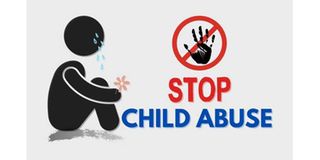How school initiative is curbing child abuse in Kilifi

Child abuse subjects children to physical, emotional or psychological conditions that violate their rights as envisioned in the Children’s Act.
What you need to know:
- The project targeted learners aged 10–14; Kaloleni leaders say it has helped address sexual abuse, early pregnancy and drug and substance abuse among learners.
- Mariakani Assistant County Commissioner says the children have realised that it is their right to be in school.
For many years, young girls in Kilifi County have faced challenges that subject them to gender-based violence (GBV) and affect their education.
The high GBV rate saw the county record many cases of early pregnancies. However, in 2018, Deutsche Stiftung Weltbevölkerung, Kenya, a non-governmental organisation, started the Holistic Action Project for Young Adolescents (Hapa) programme in primary schools in Kaloleni Constituency to help pupils realise their full potential.
It targeted learners aged 10–14. Speaking during the dissemination of the Hapa report in Kilifi town, leaders from Kaloleni said the project had helped address sexual abuse, early pregnancies and drug and substance abuse among learners. Mariakani Assistant County Commissioner Dennis Barasa said the children had realised their right to be in school.
“The programme has been engaging the learners directly and made them know that they are supposed to focus on their education and aim to join higher learning institutions,” he said.
Mr Barasa said the number of children attending disco matanga (night discos) had declined, indicating that they were aware of its dangers and negative impacts on their education. In addition, the constituency is witnessing a reduction in the number of school dropouts.
“Education is important for any child where the government and parents have invested. It is time for the children to focus on their studies for a better future,” he said.
Community Action Committees (CAC) secretary Kahindi Rimba said parents have embraced education and support their children to be in school. "It was discouraging to see many girls drop out of school because of early pregnancies. The girls were victims of forced marriages and a poor and miserable life," he said.
Exploitation
Mr Rimba said men took advantage of vulnerable girls in the drought-hit area to lure them into sex. “Girls used to take small money from men in exchange for sex, but we were able to talk to them with the help of teachers to encourage them to focus on their education for a bright future.”
He cited Mihingoni Primary School, which recorded zero pregnancies in 2022. “We are happy because our children are in school and parents have shunned the retrogressive culture that hindered girl-child education.”
Mr Rimba called on partners and the community to support education.
Ms Celestine Mdzomba, a teacher at Vishakani Primary School, said the school had benefitted from campaigns against drug and substance abuse. She said they sensitised their pupils to cultural practices, HIV/Aids, and drug and Substance abuse.
“The learners were drug addicts and would smoke bhang available in the neighbourhoods because the public would smoke openly at any time. We were severely affected, but with several interventions, we are happy it has stopped,” she said.
Ms Mdzomba, herself a mentor, said the CAC played a crucial role through community dialogues that brought on board parents to discuss the importance of protecting their children and supporting their education.
She said the programme brought on board men to take part in the education of their children. According to Ms Mdzomba, fathers neglect their responsibilities, leaving mothers to carry the burden of their children’s education.
“Currently, male parents are coming to school to interact with teachers and enquire about their children, which has impacted the face of parenthood in the education sector.”
Nine schools benefit
Hapa programme manager Stephen Kibindu said the three-year project was in nine primary schools. It entails the establishment of Hapa clubs with 45 members, boys and girls.
“Young adolescents were put at the centre of the project to be sensitised and equipped with information on life skills, gender-based violence and harmful cultural practices, which they helped pass to other pupils,” he said.
He said CAC consists of local administrators, representatives from the gender department, Health and Interior ministries, volunteers, young people, paralegals and volunteers.
The committee created awareness of sexual reproductive health, and identified child abuse and GBV cases. The pupils are now peer educators, promised to be role models in schools and the community.
Anisa Abdalla, a 12-year-old Grade Six pupil at Chanagande Primary School, said she solves problems at school and at home. “I can approach my fellow pupils with indiscipline issues and talk to them about something, which has helped them to concentrate on their education.”
Adbdalla disclosed that she had gained courage and was good at public speaking.
Joyce Muteke from Shangia Primary School said she narrowly escaped sexual abuse.
Randu Kilumo, a 14-year-old pupil at Vishakani Primary School, said the project had instilled discipline in learners, who can now focus on their education to shape their future.
According to the Kenya Population and Housing Census 2019 on the status of Adolescent Sexual and Reproductive Health in Kilifi, 379,072 are aged 10–19. Out of the number, about 206,722 are aged 10–14.





